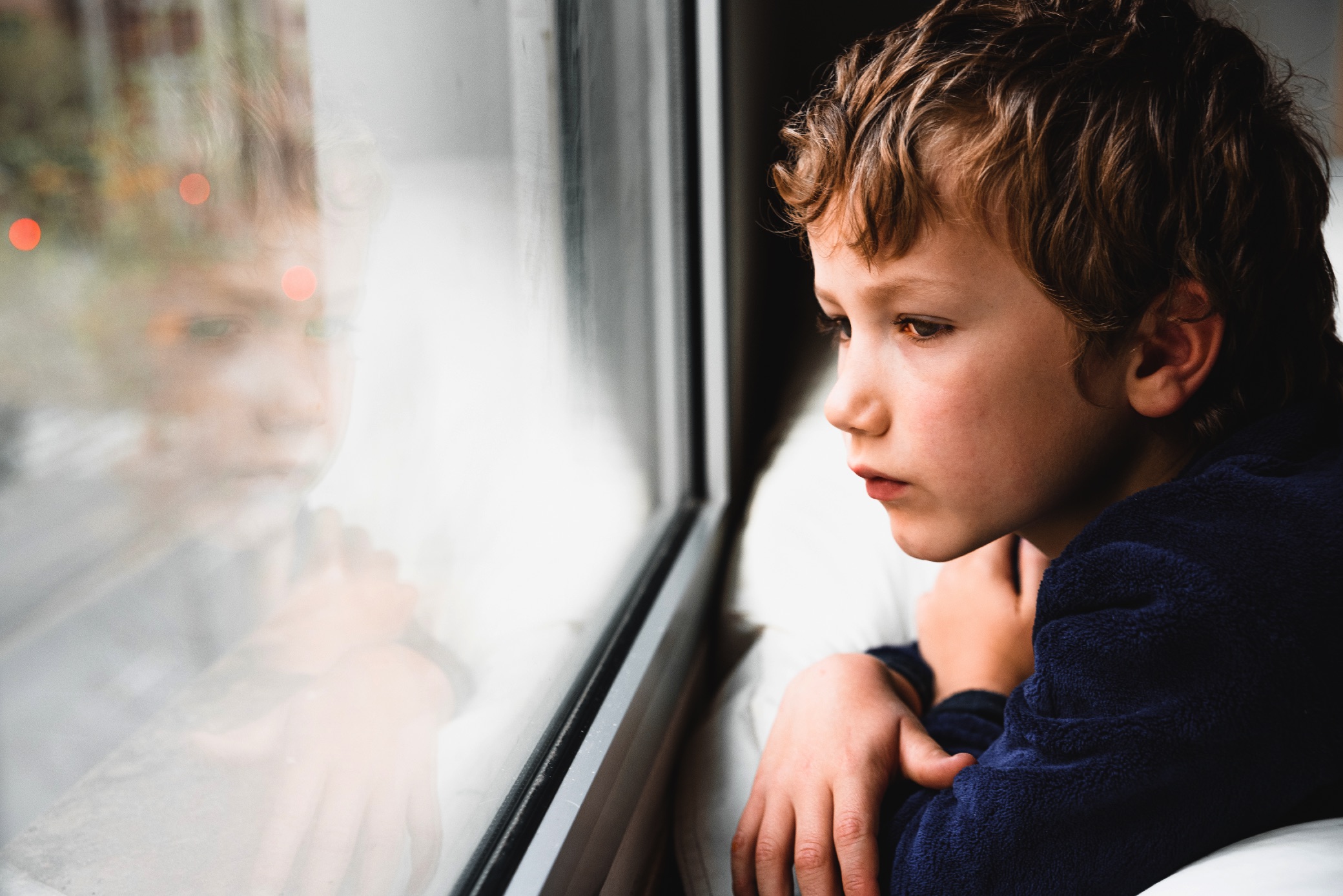Sometimes we can be so wrapped up in our own lives that we can miss the signs that our child may need help, too. I don't need to tell you that as adults, we are all busy juggling work, family, health, as well as our social and personal lives; and so the stresses, anxiety and worries quickly build up. Without a good self-care routine, these problems can get overwhelming and before you know it, you may be struggling just to keep your head above water.
If you have children, then this can add to your stress exponentially. Not only are you dealing with your own life, but you also need to take into consideration that their routines are kept, their health issues addressed and all of the many other areas that come with this (including homeschooling!). But as many people tend to put self-care as a lower priority of their own long list of to-do's, this also can be the case for our children's needs.

Our children will mirror a lot of our own tendencies and behaviours, which makes sense because this is what they see - at this stage, we are their biggest role models and influencers in their lives. So if we tend to worry about everything, it's not surprising that they will too. After all, you only know what you know. This isn't even going down to the energetic level of how your energy influences your surroundings and vice versa - but for this article, we will just focus on the external and 'seeable'.
So how can you tell if your child is stressed?
People are all different and show things in different ways - so it's not always as obvious as you may think. While some people will express their emotions and tell people that they are stressed and worried, there are others who will internalise and bury their feelings, appearing unflustered and calm on the outside. And then there is the other extreme where someone may not even be aware that they are feeling these negative emotions and just carry on with life until their stresses build up to a dangerously unhealthy level and physicalises as a serious health condition.
With children, this is exactly the same. Not all children will tell you that they are feeling stressed...or not directly and in so many words. For example, I have three boys of which one of them will talk endlessly about anything and everything about their day (but not necessarily about what they are feeling) and the other two are quieter and will not even share their day's events unless they are probed to do so (and even then I may only just get the bare minimum!). It was only recently that I noticed some of the 'signs' that triggered me to take action. But so often, these signs can go unseen and then it becomes a greater problem that is more difficult to address in their teenage years or even adult life.
1) Aches and pains

If your child complains about stomach issues, or has headaches, apart from checking that this isn't a condition that requires medical attention, this may be a sign that there is
tension building up. This shouldn't come as a surprise at all, as we all know what it feels like and have probably come across this ourselves before. Schedule some downtime and let them have a relaxing bath before bed, and make sure you also give them time with you to chat about their day and share a laugh or two together.
2. Trouble sleeping
This may include disrupted sleep, bedwetting, nightmares and insomnia. Again, it's important to get into a good bedtime routine where there is sufficient downtime. Television, gadgets and video games are a definite no and should be limited throughout the day. Especially if your child is of school age and doing class lessons on the computer, it's so crucial that they get enough exercise and time outside when possible. If you're working, then try to schedule a short walk outside after a quick lunch together - this will benefit both of you and also allow for some valuable bonding time.
3. New habits

Does your child have any habits that are new, or that they haven't grown out of? This may be thumb-sucking, nail-biting or anything else you have noticed about them (even hair
pulling, skin peeling, itching or a nervous twitch). Many times, these habits serve as comfort or can be a form of nervous energy coming out to distract them from what's really bothering them.
4. Acting out or aggression
Unfortunately with our busy lives, we tend to automatically put our child's negative behaviour down as simply 'being naughty' and then focus on how to discipline them. Even worse, we may neglect the problem altogether by letting them 'get away with it' and opt for the easy route - especially if we're too busy to deal with the issues. Although these acts of defiance may be the normal stages of growing up, as children all need to test boundaries, this may actually be a cry for help that we shouldn't ignore.
5. Difficulty concentrating
There is no doubt that school can be a tremendous pressure on children, which not only comes from teachers, but also from parents. Not every child will be a straight A student (and this shouldn't be the case) and it's particularly important to not judge your child based on your own expectations for yourself. If you were good at science, this doesn't mean that your child will be, nor does it mean that they will enjoy it if you did. Also, it's important to praise them for their merits, and not just scold them for their misses. I know that I don't perform well when I'm upset or feel that I'm incompetent, so why should we make our children feel this way when they don't achieve top marks.
6. Oversensitivity

This can happen if your child is a 'pleaser' and puts too much pressure on themselves to be the perfect child (yes, this too can happen!). This may not be the child's fault though,
but we need to see if we, too, are being too controlling or setting too many rules or conditions to dictate how our child should behave. I have fallen into this myself, as at one point I had 3 children under the age of 2, and decided early on that I needed to follow strict routines so that I wouldn't lose my sanity. Although this worked at the time, everything has its pros and cons and eventually balances out in the end. The obvious gain is that my house is in order with happy children that listen and behave, but this also results in having 'pleaser' children who aim for a perfection which can be stressful for them. So sometimes the signs are not as obvious and even positive situations can have their concerns when we can recognise these signs.
7. Lack of attention
This is not a sign from the child, but more of something that we need to stop and think about. Many children will find ways to act out, consciously or subconsciously, when they are not getting enough attention from home. We may not like to admit it, but we need to seriously think about whether we spend enough quality time with our kids. You can have dinner together, but this doesn't necessarily mean that the child is getting the attention they need if the conversation is around school, what they did (or didn't do) and other matters that don't display the aspects of love and nurture. Try to schedule some time to just have some fun and let them choose the activity. Maybe even tell them a funny story about when you were young, or how you made mistakes, were nervous about a school play, or anything else that can show them you are only human. When your child can relate to you, they may feel more comfortable in opening up to you about similar feelings they are going through, which will open up a whole new dimension to your relationship.
8. Skin
Finally, I chose to include this as one of the signs of stress because this is a recent one in my household that triggered my attention. When people are stressed, they are more prone to skin conditions, or it can aggravate existing skin conditions - whether this is a nervous habit of touching your face or biting your nails or a more physiological reason for having prolonged stress hormones in your body that has a direct cause and effect on your body's largest organ. I have written a case study for this (with the link below) where you can read about my eldest son and a skin growth on his leg that appeared to me as a sort of raised mole or wart. There was no reason for concern as it didn't bother him and wasn't changing in appearance at all. I only noticed it because I decided to do a stress treatment on him before his exams, and this is when the mole started to change. You can read more in my case study for the details, but essentially, many skin problems can be caused by stress in our bodies. In my son's case, working on his emotions for the past few weeks has dramatically changed the appearance of his mole, which is now completely gone. The treatments are still ongoing, but I've decided to include the case study-in-progress as it clearly demonstrates what stress in the body can do, and the drastic changes that occur when the stress is removed.

Self-care is essential to our well-being and for managing our levels of stress. But it's equally, if not more important, for us to be able to help our children before their own stress levels become unmanageable and difficult to deal with in later years. Unlike us, they may not be equipped with the tools and knowledge to understand their own bodies and how stress affects them. They may not be able to connect their negative behaviours as being a direct result of their negative thoughts and emotions. Some schools have already adopted many mental health techniques for well-being such as mindfulness and meditation, with this being on an upward trend. But in the home, it's our job to help our children to just be children, to show them our unconditional love, our support, and to equip them with the tools to minimise their discomfort. And when we invest the time to nurture the relationship and their well-being, the benefit is not only to them but to you as well.
